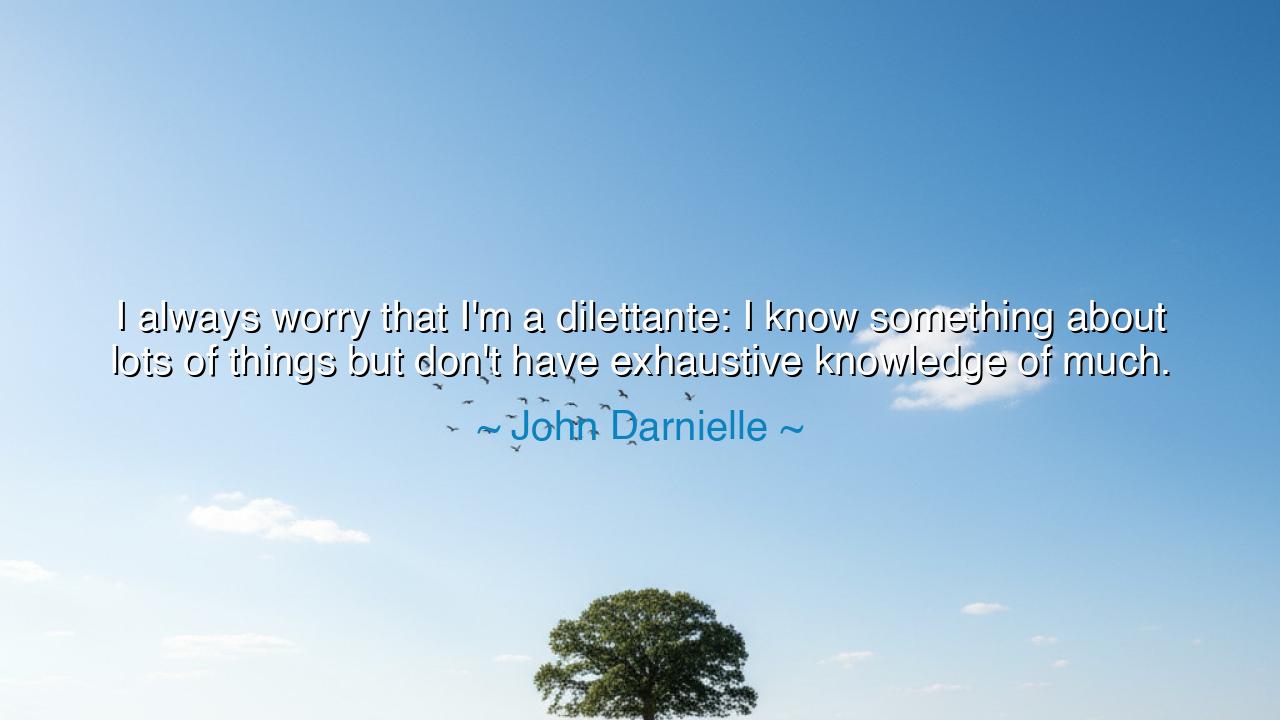
I always worry that I'm a dilettante: I know something about lots
I always worry that I'm a dilettante: I know something about lots of things but don't have exhaustive knowledge of much.






The words of John Darnielle — “I always worry that I’m a dilettante: I know something about lots of things but don’t have exhaustive knowledge of much” — speak with the humility of a true seeker. Beneath their modest surface lies a profound reflection on the nature of knowledge, identity, and the anxiety of the modern mind. Darnielle, the poet and songwriter behind The Mountain Goats, captures the tension between breadth and depth — between the wide curiosity that hungers for all things and the deep mastery that demands devotion to one. His confession is not mere self-doubt, but a meditation on what it means to live in an age overflowing with information yet starving for understanding.
In the style of the ancients, one might say: “The river that touches many lands may nourish them all, but the spring that carves the stone leaves a deeper mark.” Darnielle’s words reveal the pain of standing between these two truths — the desire to know much, and the longing to know deeply. In this he joins a lineage of thinkers who wrestled with the same paradox: the Renaissance man, who sought to grasp all knowledge, and the specialist, who devoted his life to a single thread of truth. The dilettante stands in the middle — curious, alert, passionate — yet haunted by the fear that his learning is shallow, that his wisdom is scattered like seeds upon the wind.
The origin of this thought lies not in academia, but in art. Darnielle, whose music explores the broken edges of human experience, understands that art itself often requires the hand of a wanderer. The artist must dip into many wells — literature, history, theology, love, and pain — to bring forth creation. Yet the artist also feels the burden of incompleteness. For every subject explored, ten remain untouched. For every truth glimpsed, a thousand lie veiled. Thus, his worry of being a “dilettante” is not vanity, but vulnerability — the cry of one who fears that his knowing is too thin to bear the weight of meaning.
History offers a mirror in the life of Leonardo da Vinci, the quintessential genius and, perhaps, the most brilliant dilettante who ever lived. Leonardo painted, invented, sculpted, dissected, and dreamed — yet even he left much unfinished. His notebooks overflowed with sketches of unrealized machines and half-written theories. Critics of his day whispered that he lacked focus, that he began too much and completed too little. Yet what they failed to see is that Leonardo’s restless curiosity was itself his genius. Like Darnielle, he was moved not by mastery, but by wonder — the endless pursuit of beauty across many forms. His depth was not in one field, but in the very act of connecting them all.
There is a quiet heroism in such restlessness. To “know something about lots of things” is not a weakness, but a reflection of the vastness of creation. The mind that explores many paths may never own a single mountain, but it glimpses many summits. The danger lies not in curiosity itself, but in distraction without synthesis — in gathering fragments and never weaving them into wisdom. Darnielle’s worry reminds us that true knowledge is not measured by volume but by integration — by how the pieces of what we learn fit together to form understanding.
The ancients taught that wisdom is unity — the bringing together of many truths under one light. Thus, the task for those who fear being dilettantes is not to narrow their curiosity, but to discipline it, to see how each branch of learning feeds into the trunk of self-knowledge. To know oneself, as Darnielle’s unease implies, is the only mastery that unites all others. When we study art, science, history, or philosophy, we are ultimately learning the same thing: the mystery of being human. The dilettante’s scattered knowledge, if brought into harmony, becomes the philosopher’s insight.
So let this be the teaching: do not fear the breadth of your curiosity, but learn to give it purpose. Know many things, but return always to the question of why they matter. Be both the wanderer and the craftsman — roam widely, but build deeply wherever you rest. The world needs both the master and the explorer, the scholar and the dreamer. As Darnielle’s confession reminds us, the worth of knowledge lies not in its quantity, but in its depth of meaning. For in the end, even if you do not know everything, to know truthfully — to know with sincerity and love — is enough to make a life whole.






AAdministratorAdministrator
Welcome, honored guests. Please leave a comment, we will respond soon